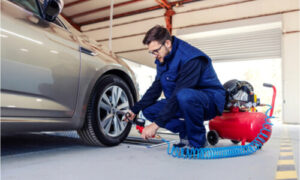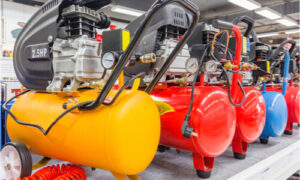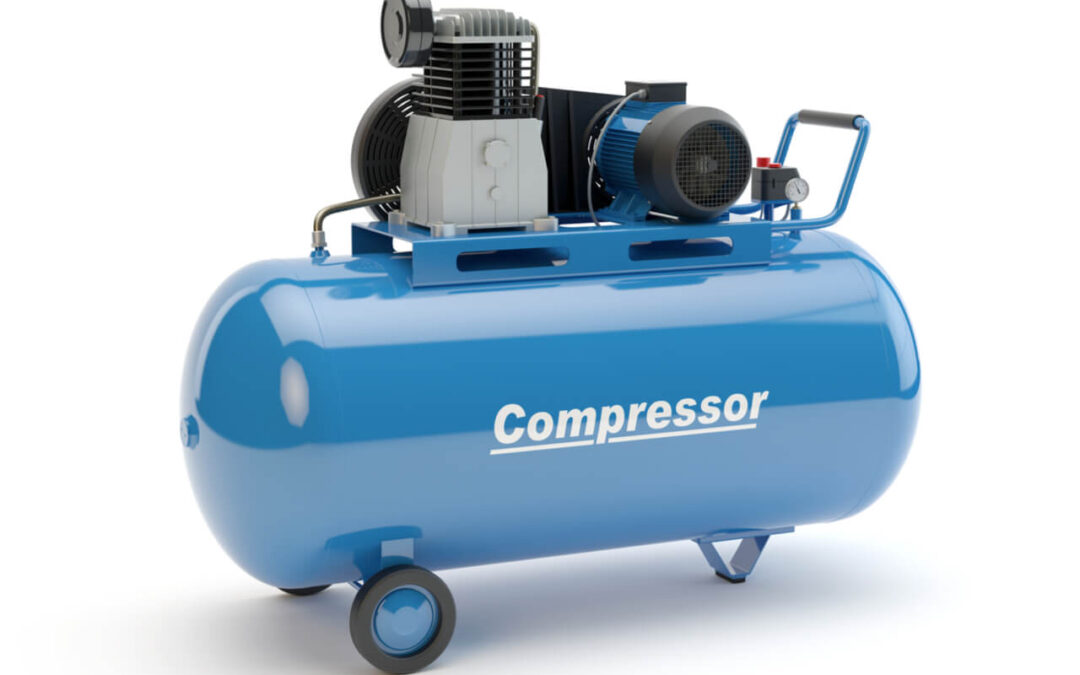A dental air compressor is an essential machine that every dental office should have. These dental air compressors power the most crucial instruments in a dental clinic. The compressors are tightly monitored to prevent patients from obtaining hazardous contamination. Know the different air compressor types, what type is specifically used by dentists and other medical-allied professionals, and how one can choose the best for their practice.
Types of Air Compressors
The two main types of air compressors consist of:
- Positive Displacement Compressors
- Dynamic Compressors
Positive Displacement Compressor
A specified quantity of air is trapped in a compression chamber in positive displacement compressors. The volume it occupies is mechanically reduced, causing a corresponding rise in pressure before discharge. Rotary screw, rotary vane, and reciprocating compressors are the three most common positive displacement compressors found in small- and medium-sized industries.
Rotary screw air compressors
Rotary screw compressors are the most common type of air compressor, with their reputation to have a higher efficiency rating, low installation space requirement, less vibration, and long service life. In a rotary screw compressor, air sucks into the compressor, closes the openings, and compresses the air with the help of two rotors that rotate continuously and run via the cavity. The air pressure gradually increases with each revolution until it touches the desired pressure.
Rotary vane compressors
The rotary vane compressor is another well-known compressor with two asymmetrical rotors (also known as spiral screws) used to compress the air. These compressors are used for the applications such as tire inflation in tires and wheel shops, dry cleaning, paint pumps, etc.
 Reciprocating air compressors
Reciprocating air compressors
This type of air compressor uses a piston or plunger that pushes and constantly moves to pull the air in and then compresses it. The reciprocating air compressor uses the piston as the compressing and displacing element within a cylinder. Small models of this reciprocating air compressor are mostly found in vehicles, while chemical plants and oil refineries use larger models.
Dynamic Compressor
Dynamic compressors pressurise air by rotating impellers that accelerate and decelerate the air. There are two main types of dynamic compressors: centrifugal and axial compressors.
- Centrifugal. These centrifugal compressors are mainly utilised for constant, fixed applications in industries like petrochemical plants, natural gas, chemical plants, and oil refinery processing plants.
- Axial. Axial compressors are not typically used in industrial settings. They are mostly and traditionally seen in jet engines, high-speed ship engines, and small-scale power stations.
A Dental Clinic’s Compressed Air System
Dental clinics rely on air compressors to keep their patients safe and comfortable every day. On the other hand, new air compressors may become a significant investment for most clinics, so choosing the appropriate one is critical.
There are three key considerations when selecting an air compressor for your dental practice, and we call them the 3Ps:
- Power: To run their equipment efficiently, most dental offices require compressors of between one and five horsepower.
- Pressure: Each dental instrument requires a certain amount of pressure to work effectively, and air compressors must deliver adequate pressure to safely operate all of your equipment at the same time.
- Production: Make sure your compressor choice exceeds your practice’s required cubic feet per minute (CFM) or litres per minute (LPM) ratings to handle your dental equipment easily and accommodate new additions as necessary.
What to Look for in a Dental Air Compressor
Air compressors are the heart of dental surgery. This machine compresses, cleans, dries and stores air, which powers handpieces and certain functions of dental treatment centres and handpiece cleaners. Your practice should be dependent on a steady, reliable supply of high-quality compressed air.
Dental air compressors used to be lubricated with oil. But there’s been an increasing shift towards oil-free compressors since the oily residue is not a pleasant sensation for patients to experience.
There is another issue that affects dental air compressors: moisture accumulation. When air is compressed, the water content in it also condenses and can provide a haven for bacterial buildup, leading to an unsanitary compressor.
An efficient, safe, and patient-friendly modern compressor should be:
- Oil-free mechanism
- Dry (having a system to dry out the water in the compressed air)
- Quiet (to avoid bothering your patients)
- Maintenance-free (to save you time)
If you are looking for a reliable dental air compressor, why not choose Cattani? Across the Australian dental industry, the name ‘Cattani’ represents reliability and the highest quality standard. As a dentist, you can’t afford to have equipment that isn’t reliable and high-quality. That’s why you’re shopping for a new Cattani air compressor.
And if you’ve decided that you want to invest in a reliable Cattani compressor for your dental clinic, you’ve come to the right place. Cattani Compressors is in the business of helping your dental clinic find the right equipment and dental consumables. Visit our website or contact us at (02) 8880 9257 for more information on how our products, like the Cattani dental air compressors, can improve your dental practice.
References:
https://www.news-medical.net/Clinical-and-Diagnostics/Dental-Compressors
https://www.linkedin.com/pulse/what-dental-compressor-importance-compressors-practices-akanksha-jain



